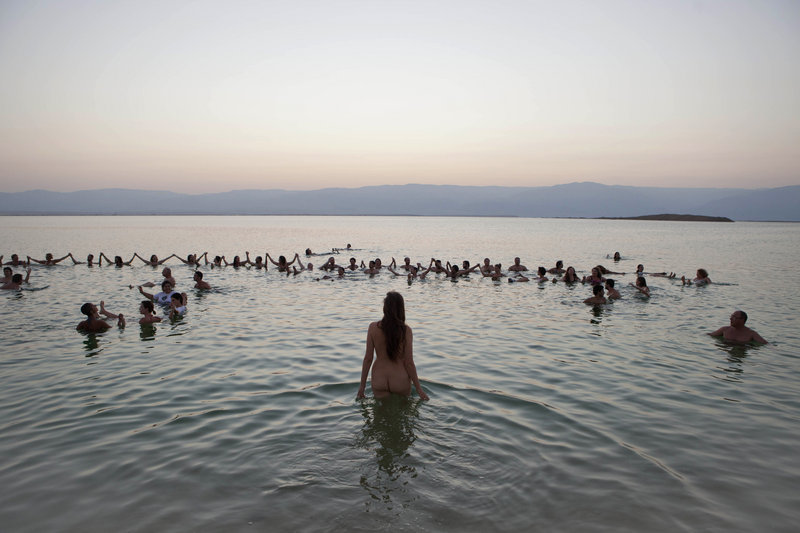JERUSALEM – The Dead Sea is shrinking at a record rate, prompting calls for Israel and Jordan to stop fertilizer makers from siphoning so much of the water whose restorative powers have attracted visitors since biblical times.
The salty inland lake bordering the nations dropped a record 4.9 feet over the last 12 months because of industry use and evaporation, the Hydrological Service of Israel said. That’s the steepest Dead Sea decline since data-keeping started in the 1950s. Half the drop was caused by Israel Chemicals Ltd. and Jordan’s Arab Potash Co., said Gidon Bromberg, Israeli director of the Friends of Earth Middle East.
“This is unacceptable and speaks to the urgency of the need to force industry to change their extraction process,” Bromberg said in an interview from Tel Aviv.
The makers of potash, a raw material for fertilizer, are competing for water with a centuries-old tourism industry on the Dead Sea, Israel’s most crowded leisure destination last year with 857,000 visitors. That’s more packed than Tel Aviv and Eilat’s beach resorts, the Tourism Ministry said.
It isn’t only pumping causing the degradation of the Dead Sea, a biblical refuge for King David. Agriculture diverts water for crops from the Jordan River that feeds into the Dead Sea, adding to a decline that’s created potentially life-threatening sinkholes by the shore.
On the north shore of the Dead Sea, spas offer the medicinal benefits of mud baths and mineral springs. Those wanting to bob in waters about 10 times as salty as the ocean must either ride in a cart for several minutes or take a hike that’s a little longer.
Dead Sea Works, owned by Israel Chemicals, denied any increased pumping.
“The main reason for the declining sea level is the increased usage of the water that used to flow to the Dead Sea in the past, especially from the Jordan River, by all countries in the region,” the company said in an emailed statement.
Jordan and Israel should reinvigorate a joint committee that hasn’t met for more than a decade to work on developing extraction techniques that use less water, Bromberg said.
Israel’s Environment Ministry said it’s working on a proposal with the government that examines the use of all resources, including phosphates and mineral water.
Israel allocated $223 million this year to rehabilitate and develop the Dead Sea’s tourism potential. Spencer Tunick’s group photo in 2011 of naked people at a beach raised awareness of sinkholes and shrinking shores of the lowest place on Earth at 414 meters below sea level.
About one-third of the Dead Sea’s surface area has disappeared and sinkholes are common as the waters shrink amid drought, agricultural diversion, largely from the Jordan River, and pumping to extract minerals for fertilizers.
Jordanian, Palestinian and Israeli policymakers, under the auspices of the World Bank, have been examining various plans to halt the Dead Sea’s decline. These include two tunnels and a pipeline that may cost as much as $10 billion. These would transfer water about 110 miles from the Red Sea and brine from desalination plants to keep Dead Sea levels stable.
Send questions/comments to the editors.



Success. Please wait for the page to reload. If the page does not reload within 5 seconds, please refresh the page.
Enter your email and password to access comments.
Hi, to comment on stories you must . This profile is in addition to your subscription and website login.
Already have a commenting profile? .
Invalid username/password.
Please check your email to confirm and complete your registration.
Only subscribers are eligible to post comments. Please subscribe or login first for digital access. Here’s why.
Use the form below to reset your password. When you've submitted your account email, we will send an email with a reset code.